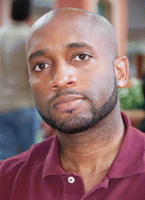The old-fashioned barbershop, still a staple in neighborhoods with large minority populations, may be poised for a new role as an outpost on the frontiers of health care.
One energetic resident at the University of Massachusetts has spent the last few years working with the Mosaic Cultural Complex, a community group, to develop a program in which barbershops will serve as sites to screen for diabetes, hypertension, depression, and anxiety.
"The barbershop is not just a place to get a haircut," said chief resident Teo-Carlo Straun, M.D., a PGY-4 at the University of Massachusetts School of Medicine at Worcester. "It's a social organization, a place of social and political interaction."
The barbershop in African-American and Latino cultures is a place where men congregate and talk even when they are not getting a haircut, said Straun.
"There are few other places where men can sit for 30 minutes and just talk," he said. "It's almost like therapy."
Moreover, like a therapist, the barber is good at listening to his customers, understanding what they are thinking, and serving as a source of advice.
The shop's role as an adjunct to the health system began in California with screenings for hypertension and diabetes and has since expanded elsewhere in the United States, said Straun. The Worcester program's innovation is the addition of mental health testing to the mix.
"This is Teo-Carlo's project, but the psychiatry faculty will mentor him, help with systems questions, and discuss ways to link the barbershops with the department's services, if needed," said Department of Psychiatry Chair Douglas Ziedonis, M.D. The barbershops might even become stops for site visits for other residents or a rotation, he said.
The department has a longstanding commitment to community psychiatry and draws residents interested in the field, he said.
Novel Approach to Increasing Access
The barbershop project is a useful way to overcome access issues by bringing information and an initial contact into a trusted corner of an underserved community, said Straun.
Worcester is a logical place to try out the model. It's the second largest city in New England, with a diverse, culturally complex population and a good health care infrastructure, including the University of Massachusetts, St. Vincent's Hospital, and several community clinics, said Straun.
It also had its fair share of inner-city crime when Brenda Jenkins, B.S., a cofounder of the Mosaic Cultural Complex, created "Soulful Sundays" in 2002. She opened these informal weekly meetings to men of color with histories of crime or addiction or who had just fallen through the cracks of life, she said.
The men came to her office for extended conversations about their lives using the Native American "Peace Circle" model, in which only one person at a time speaks.
"Guys came in and just talked—about their traumatic experiences and drug use," said Straun. There was little overt mention of depression. "They used these conversations to reframe their past and express their shame, guilt, loneliness, and regret as a step toward changing their lives."
Some Had Been Misdiagnosed
Many of the men who came into the Peace Circle group had been misdiagnosed or were either overmedicated or undertreated for psychiatric disorders.
"We were concerned with the disconnect between the medical system and our population," said Jenkins.
After a time, she and her coworkers linked these men to social services, education and training resources, and financial literacy programs.
In 2010, Mosaic received several grants that led to field research suggesting the value of basic health interventions to help men in these neighborhoods overcome the earlier neglect in their lives. Research also indicated that if health professionals of color were available, perhaps the men would relate better to them and be more forthcoming about their conditions, said Jenkins.
She recruited Straun to help with the planning, and the idea for the Barbershop Health Network was born.
Now, Jenkins, Straun, and about two dozen others from Worcester's medical, government, social service, and private sectors are about to launch a pilot program consisting of five barbershop owners, several community health workers, and two physicians.
When fully operational, the network will set up health screenings once a month in each barbershop. For those screening positive for depression or anxiety, Straun is arranging for open clinics in the evening at a UMass site within a day or so, to avoid long delays for follow-up.
The barbershops will serve not only as screening sites, but also as outlets for printed information and showings of health-related DVDs on the near-ubiquitous big-screen TVs, said Straun.
He's also working hard to get his colleagues and medical students involved. He brought Jenkins in to talk to medical staff and students, and persuaded the local chapter of the Student National Medical Association to get involved as its long-term community project.
Straun has shown an ability to cross the many boundaries inherent in the project, said Jenkins.
"He's a medical professional who is a man of color and he is able to convey the value of medical institutions" to people who are often wary of them, she said.
"I can't recall another program like this one," said Hunter McQuistion, M.D., president of the American Association of Community Psychiatrists and director of the Division of Outpatient and Community Psychiatry in the Department of Psychiatry at St. Luke's and Roosevelt Hospitals in New York City. "It sounds like a great idea."
MIT Had Long Interest in Psychiatry
Straun has a longstanding interest in community psychiatry.
A native of the U.S. Virgin Islands, Straun signed up for a summer program after his junior year in high school in which he observed a doctor at work. That set him on the road to science and medicine that led through Bloomfield College in New Jersey to Robert Wood Johnson Medical School and now to the University of Massachusetts.
"Nothing was going to stop me from going to medical school, being a doctor, and giving back to the community," he said.
Besides his chief residency and work with the Barbershop Health Network, Straun also has a heavy load of volunteer activities. He collects clothes for homeless people, leads interest groups for high school students about neuroscience and mental health, and runs the local "Brain Bee," a National Science Foundation program in which high school teams compete in answering questions on neuroscience. He also coordinates a program to place high school students into clinics and research groups so they can learn more about medicine and science as career options.
"Psychiatry was a great fit," he said about his decision to enter the specialty. "It gives me an opportunity to see the whole person. There are things happening that have nothing to do with the pathophysiology of disease."
He plans to stay on for another year at UMass after residency to see the Barbershop Health Network move into full operation and then enter an addiction psychiatry fellowship. However, Straun has already joined a line of other young, innovative community psychiatrists in training at the university, said Sheldon Benjamin, M.D., a professor and vice chair of education and training at UMass.
In recent years, other residents have extended efforts to help homeless mentally ill individuals, said Benjamin. Another started a support group for women with chronic mental illness who needed help with mothering their children.
"I can't take any credit for the barbershop program," he said. "I just encourage good residents to do good things."
Some more of those good things will start happening in August, when the Barbershop Health Network moves from planning to operation.

